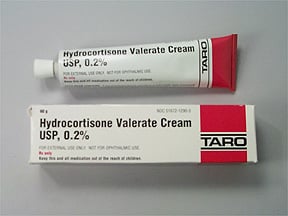
Hydrocortisone Valerate Coupons & Savings Card – Discount Prices from $9.27
Hydrocortisone valerate is a medium-strength topical corticosteroid used to alleviate various skin conditions, such as eczema, dermatitis, psoriasis, skin allergies, and rashes. It effectively reduces inflammation, itching, and redness associated with these conditions. Available in different formulations like cream, ointment, lotion, and solution, hydrocortisone can be purchased over the counter in lower strengths (e.g., 1%) or by prescription in higher strengths (e.g., 2.5%). Generally, when used as directed, it causes minimal side effects, though in rare cases, it may lead to topical steroid withdrawal. Be vigilant for worsening skin rashes or irritation after discontinuing use. Always consult your healthcare provider before starting or stopping this medication to ensure its safe and effective use.
Our coupons are free to use. Before paying, show the pharmacist your Hydrocortisone Valerate savings card to get your free discount. Use our filters below to edit the prescription box to match your needs. The Hydrocortisone Valerate prices will update based on your prescription needs. Above our Hydrocortisone Valerate coupons, you can change your location to see pharmacy prices and costs in other areas. We're here to help you buy Hydrocortisone Valerate at the lowest price with our prescription discount card.
My prescription
Edit
15GM of 0.2%, Hydrocortisone Valerate (1 Tube)
Select pharmacy

CVS
$20.16
COUPON PRICE
Walmart
$9.27
COUPON PRICE
Walgreens
$13.59
COUPON PRICE
Albertsons
$19.24
COUPON PRICEHydrocortisone Valerate savings card
Show this card to your pharmacist
Walmart
$9.27
BIN
ID
PCN
GRP
019876
LH606E282E
CHIPPO
LHX
Powered by
Hydrocortisone valerate is a medium-strength topical corticosteroid used to alleviate various skin conditions, such as eczema, dermatitis, psoriasis, skin allergies, and rashes. It effectively reduces inflammation, itching, and redness associated with these conditions. Available in different formulations like cream, ointment, lotion, and solution, hydrocortisone can be purchased over the counter in lower strengths (e.g., 1%) or by prescription in higher strengths (e.g., 2.5%). Generally, when used as directed, it causes minimal side effects, though in rare cases, it may lead to topical steroid withdrawal. Be vigilant for worsening skin rashes or irritation after discontinuing use. Always consult your healthcare provider before starting or stopping this medication to ensure its safe and effective use.
Our coupons are free to use. Before paying, show the pharmacist your Hydrocortisone Valerate savings card to get your free discount. Use our filters below to edit the prescription box to match your needs. The Hydrocortisone Valerate prices will update based on your prescription needs. Above our Hydrocortisone Valerate coupons, you can change your location to see pharmacy prices and costs in other areas. We're here to help you buy Hydrocortisone Valerate at the lowest price with our prescription discount card.
More prescriptions for skin allergy
coupons from$27.16Save 70%
coupons from$4.25Save 84%
coupons from$1.01Save 95%
coupons from$617.96Save 73%
coupons from$1499.11Save 72%
coupons from$19.83Save 80%
coupons from$102.59Save 76%
coupons from$29.04Save 62%
More prescriptions for skin allergy
Fluocinolone Save 70%coupons from $27.16
Diprolene Af Save 84%coupons from $4.25
Phenergan Save 95%coupons from $1.01
Apexicon E Save 73%coupons from $617.96
Atopaderm Save 72%coupons from $1499.11
Dexamethasone Intensol Save 80%coupons from $19.83
Dexchlorpheniramine Save 76%coupons from $102.59
Clodan Save 62%coupons from $29.04
Hydrocortisone Valerate dosage forms
Use our Hydrocortisone Valerate 15GM of 0.2% coupon with prices from $9.27 for 1 Tube. You can also use our Hydrocortisone Valerate 15GM of 0.2% coupon with prices from $16.04 for 2 Tubes. We have a Hydrocortisone Valerate 15GM of 0.2% coupon with prices from $22.77 for 3 Tubes.
Dosage Quantity Price from Per unit 15GM of 0.2% 1 Tube $9.27 $9.27 15GM of 0.2% 2 Tubes $16.04 $8.02 15GM of 0.2% 3 Tubes $22.77 $7.59
| Dosage | Quantity | Price from | Per unit |
|---|---|---|---|
| 15GM of 0.2% | 1 Tube | $9.27 | $9.27 |
| 15GM of 0.2% | 2 Tubes | $16.04 | $8.02 |
| 15GM of 0.2% | 3 Tubes | $22.77 | $7.59 |
